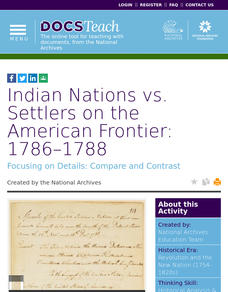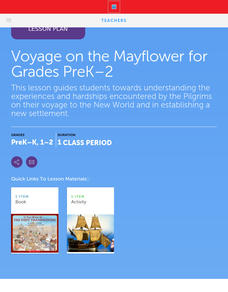DocsTeach
Lewis and Clark's Expedition to the Complex West
Lewis and Clark's famous expedition is a prime example of the United States' westward expansion. Aspiring historians examine maps from Lewis and Clark's journey, as well as discuss their interactions with Native American tribes. The...
DocsTeach
To Sign or Not to Sign
To sign or not to sign, that is the question. Scholars review the Declaration of Independence and discuss the Framers' decisions for signing the document. The activity uses primary text, a worksheet, and group discussion to help...
DocsTeach
The Voting Record of the Constitution
A piece of the past helps shape the future. Learn what historical documents reveal about the past using an engaging activity. Academics participate in a role-playing scenario, view the voting record of the Constitutional Convention,...
DocsTeach
Senators' Pay in the First Congress
Senators are public servants but they do get paychecks. The activity focuses on historical analysis and a treasury document from the first Congress. Scholars read the document, answer questions, and participate in group discussion to...
DocsTeach
Road to Revolution: Patriotism or Treason?
Patriot or traitor? Scholars debate the line between patriotism and treason in a short activity. Academics analyze a political cartoon and discuss varying viewpoints between different groups living in the American colonies. The activity...
DocsTeach
Prequel to Independence
It's about time! Young historians use primary sources to create a timeline of events leading to American Independence. The fast-paced activity is designed to be used at the end of a unit on the Revolutionary War or as an assessment tool....
DocsTeach
Political Cartoon Analysis: No Taxation Without Representation
Delve into the world of political cartoons in a lesson on the American Revolution. Scholars practice analyzing an original political cartoon, answer questions, and participate in group discussion. Young academics gain an understanding of...
DocsTeach
Indian Nations vs. Settlers on the American Frontier: 1786–1788
Once Americans won the Revolutionary War, their quest to gain land did not end. An interesting activity focuses on Americans' expansion into the frontier following the war and how it conflicted with Native Americans living in the area....
Scholastic
Voyage on the Mayflower
After completing an online activity about the Mayflower, scholars draw a picture about what they know of the Thanksgiving holiday, including a one-sentence summary. A reading of If You Were at the First Thanksgiving by Anne Kamma is the...
National September 11 Memorial & Museum
Local Heroes
The cover of The New Yorker magazine sparks a conversation about September 11th and the invaluable sacrifices the first responders made to rescue those in danger. Scholars discuss their observations, thoughts, and feelings then take pen...
College Board
Civic Knowledge and Action in AP U.S. Government and Politics
Vote, it's your civic duty! The high school lesson focuses on voter turnout and civic participation with a series of activities. Young scholars analyze data to discover voter turnout trends, complete worksheets, and participate in group...
C-SPAN
Supreme Court Justices Research and Resumes
According to Article III, Section1 of the United States constitution, the only qualification one needs to be appointed to the Supreme Court is to demonstrate "good behavior." The president and Congress are given the power to determine...
C-SPAN
Presidential Veto and Congressional Override
One of the key powers of the executive branch is the president's ability to pass or veto legislation proposed by Congress. Congress, the legislative branch, on the other hand, can override a president's veto. Five film clips show how the...
C-SPAN
Middle School Checks and Balances
Seven video clips reveal how the checks and balances built into the constitutional framework of the United states' government are designed to keep any one branch from becoming too powerful. After watching each clip, groups identify the...
Encyclopedia Britannica
Meta-Study: Political Brains
Are there differences in the brains of liberals and conservatives? That is the question young political scientists are challenged to answer. Class members examine studies, consider how the results are presented, and how the studies were...
Encyclopedia Britannica
Get out the Vote Campaign
While some of your young scholars may be too young to vote, they can get involved in the election process by creating a nonpartisan campaign encouraging voter registration. After researching how to register to vote, class members design...
Encyclopedia Britannica
Impeachment Explainer
Andrew Johnson (1868) Bill Clinton (1998) and Donald Trump (2019) were impeached by the House of Representatives. To demonstrate their understanding of the impeachment process, individual create their own "Impeachment Explainer." Writers...
Encyclopedia Britannica
Electoral College Philosophical Chairs Debate
Because of the Electoral College, it is possible to win the popular vote in a US Presidential election and still lose the election. After researching the pros and cons of the Electoral College, class members engage in a structured debate...
Encyclopedia Britannica
Election Topic Deep Dive
Researchers go beyond the surface of an election issue to craft an objective report on the history of the issue, factors surrounding the issue, and factors in a candidate' biography that may influence a candidate's position on the issue....
Encyclopedia Britannica
Candidate Reflection Essay
After writing about which of the 2020 presidential candidates the class has researched most closely represents their ideas, young political scientists take a 2020 Presidential Election Candidate Quiz to determine what candidate they in...
Encyclopedia Britannica
Election Role-Playing Debate
After watching clips of presidential candidates during debates and speeches, and researching the candidate's position on important issues, young researchers conduct a role-play debate in which they act as one of the candidates.
Encyclopedia Britannica
Presidential Electability
There are specific constitutional requirements that candidates must meet to become president of the United States. In addition, there are societal opinions that affect a candidate's electability. Class members examine historical...
Encyclopedia Britannica
Political Issue Timeline
As part of a study of US Presidential elections, class members track the history of an issue in the 2020 campaign. They create a timeline to determine if there are any patterns, if ideas about the issue have evolved, or if in issue is no...
Encyclopedia Britannica
Election Issue Comparison Chart
As part of a study of the issues raised in the 2020 presidential election campaign, class members investigate and then create a pro-con comparison chart that reveals each candidate's position on a variety of issues.

























